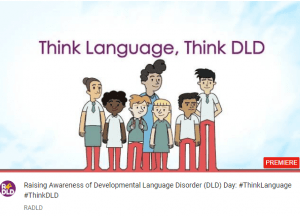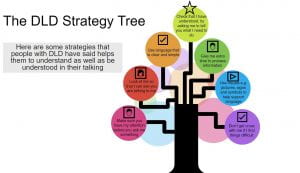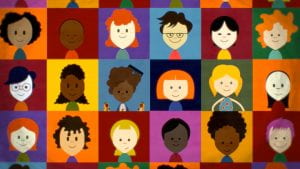
speaking-up-for-the-covid-generation-i-can-report
@icantalk’s latest report paints a worrying picture
for children’s speaking and understanding –
@educationgovuk needs to act.
Read the full findings
and recommendations now at bit.ly/3hnQCW2.
We’re adding our voice to @icantalk’s call to action
and speaking up for the Covid generation. Will you?
Join the conversation and #SpeakUpForCovidGen


What is No Pens Wednesday?*
It is a national day dedicated to speaking and understanding language which takes place in schools and settings annually. Click on the picture above, or link below to sign up and get lots of ideas to try in your class. There are ideas for Early Years, Primary and Secondary.
Why take part?
Speaking and understanding language are often overlooked in the UK education system in comparison to written language skills. However, as with literacy and numeracy, schools can play a crucial role in developing children’s skills in this important area.
No Pens Day Wednesday puts speaking and understanding language in the spotlight. Through a day of fun and engaging activities, schools and
settings can:
Raise awareness of the importance of speaking and understanding skills with staff, children and families.
Improve children and young people’s speaking and understanding skills and increase their engagement in lessons.
Support their curriculum’s focus on speaking and understanding language, and develop staff skills and confidence in teaching speaking and understanding skills.
Identify children who may have speech, language and communication needs and provide additional support.
Why is it so important?
Language levels at age two predict reading, writing and maths ability when children start school.
As many as 50% of children in some areas of social disadvantage start school with delayed language. Without early support, these children may struggle to catch up with their peers.
In Primary School:
Children who have difficulties speaking and understanding language are at a higher risk of behavioural, social and emotional difficulties in childhood and through adolescence.
More than 90% of children who have persistent language difficulties at age 5 have literacy difficulties at age 15.
In Secondary School:
Good communication skills are rated as the most important employability skills needed for young people entering their first job – from a survey of schools, employers and politicians.
Up to 88% of long-term unemployed young men may have speech, language and communication needs.
*taken from the ICAN guide to the day
(more…)
15th October is Developmental Language Disorder Awareness Day

Find out more at RADLD – click the link below and share with your colleagues

https://towerhamletssls.edublogs.org/files/2021/10/3-DLD- -Tree-v2-1.pdf
-Tree-v2-1.pdf
Download the DLD Strategy Tree to print out in your setting. Click the picture above
3a-DLD123-Info-sheet_HR (1)

DLD 1 Difficulties Talking and/or Understanding
Developmental Language Disorder is a diagnosis given when a child or adult has difficulties talking and/or understanding language
- Involves difficulties with spoken language
- Affects children and persists into adulthood
- creates obstacles to communication at school, work and in everyday life
- has no known cause although it may run in families
DLD 2 Hidden But Common
DLD is hidden and affects approximately 2 children in every classroom impacting on literacy, learning, friendships and emotional well-being
- Can be missed, misdiagnosed or misinterpreted as poor behavior, poor listening or inattention
- Was found in 7.5% of 4-5 year olds in a recent study
- Affects a child’s ability to learn at school because learning is mainly through language
- Affects reading or writing and is often linked with dyslexia
- Can be socially isolating; joining in with conversations and activities with peers can be harder, there is an increased vulnerability to bullying
- Increases the risk of lower academic achievement
- Can be associated with behavioral and/or mental health problems, unemployment and economic disadvantage
DLD 3 Support Can Make A Real Difference
Support from professionals, including speech and language therapists and teachers, can make a real difference
- It is important that DLD is identified so individuals can be adequately supported
- Speech and language therapists and specialist teachers can help those with DLD to develop skills and strategies, and to understand their difficulties and their strengths
- DLD can be a long term difficulty thus adults with DLD may also need support and adjustments in the work place
- Individuals with DLD are sociable and with appropriate support can have satisfying lives, with friendships, families, contributing to their community
Welcome to the Blog of the Language and Literacy Team from the new Learning Advisory Service. Below, you will find posts containing a YouTube video on Seeing Dyslexia Differently, Dyslexia Friendly Classrooms and information on how to use Busy Things from LGFL to develop phonics and phonological skills.
Click on the Specific Learning Difficulties heading in the blue bar above and you will find a range pages to support parents and teachers with study skills, reading, spelling and handwriting
- Helping primary pupils with reading at home
- Supporting secondary students with reading
- Tips for helping your child with their homework (primary)
- Helping secondary students with study skills and homework
- Helping to learn spellings
- Learn to read and spell Common Exception (High Frequency) Words
- Help your child with phonics
- Tips for improving your child’s handwriting
- Using games for literacy learning
- FAQ about supporting literacy

Click the image above to see this short YouTube video from the British Dyslexia Association. It explores the possible difficulties and strengths of young people with dyslexia. It is three minutes long.
The video could be used pupils, parents, teachers and teaching assistants.
Dyslexia Awareness Week is:
October 4th-8th October 2021






 -Tree-v2-1.pdf
-Tree-v2-1.pdf
